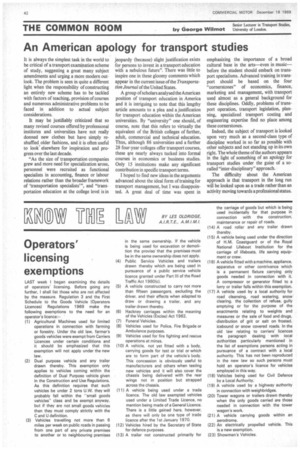An American apology for transport studies
Page 44

If you've noticed an error in this article please click here to report it so we can fix it.
It is always the simplest task in the world to be critical of a transport examination scheme of study, suggesting a great many subject amendments and urging a more modern outlook. The problem is seen in quite a different light when the responsibility of constructing an entirely new scheme has to be tackled with factors of teaching, provision of courses and numerous administrative problems to be faced in addition to actual subject considerations.
It may be justifiably criticized that so many revised courses offered by professional institutes and universities have not really donned new clothes but have simply reshuffled , older fashions, and it is often useful to look elsewhere for inspiration and progress over the last decade.
"As the size of transportation companies grew and more need for specialization arose, personnel were recruited as functional specialists in accounting, finance or labour relations -rather than the broader framework of 'transportation specialists'", and "transportation education at the college level is in
jeopardy (because) slight justification exists for persons to invest in a transport education with a nebulous future". There was little to inspire one in these gloomy comments which appear in the current issue of the Transportation Journal of the United States.
A group of scholars analysed the American position of transport education in America and it is intriguing to note that this lengthy article amounts to a plea and a justification for transport education within the American universities. By "university" one should, of course, note that this refers to virtually the equivalent of the British colleges of further, adult, commercial and technical education. Thus, although 86 universities and a further 28 four-year colleges offer transport courses, these ire nearly always tucked into formal courses in economics or business studies. Only 15 institutions make any significant contribution in specific transport terms.
I hoped to find new ideas in the arguments advanced about the ideal form of training for transport management, but I was disappointed. A great deal of time was spent in emphasizing the importance of a broad cultural base in the arts—even in music— before the student should embark on transport specialisms. Advanced training in transport should be based on the four "cornerstones" of economics, finance, marketing and management, with transport used almost as a general background for these disciplines. Oddly, problems of transport operation, transport legislation, planning, specialized transport costing and engineering expertise find no place among these cornerstones.
Indeed, the subject of transport is looked upon very much as a second-class type of discipline worked in so far as possible with other subjects and not standing up in its own right. The whole theme of the authors appears in the light of something of an apology for transport studies under the guise of a socalled "inter-disciplinary" approach.
The difficulty about the American approach is that transport in the long run will be looked upon as a trade rather than an activity moving towards a professional status.












































































